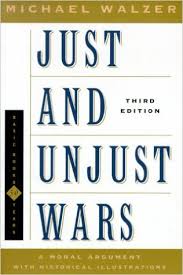
The over 300 pages of this book are either fascinating or frightening. This is not because of the subject it treats but because of the enormously detailed philosophical arguments it goes into.
The question is relatively simple: is war ever justified? Never, say the pacifists. Other, equally sincere peace lovers will proably concede there is sometimmes a case for armed conflict. The obvious example is in self-defence. But that poses a whole number of questions that are not so easily answered. And that’s the trouble. The infinite detail the auther gives us takes some following. He goes into moral realities, citing Clausewitz. He then deals with theories of aggression. What are our rights and who do we mean by “us”? Sometimes a state may take action, especially in the case of declaring war, of which many of its citizens disapprove.
Then he deals with war conventions, the “immunity” of noncombtants, for instance. Can this rule be ignored if militarily “necessary” And who decides? The whole question of the role of civilians is also dealt with. And what of resistence fighters and terrorism? Does the original question seem to be a trifle oversimplified?
Next there is a chapter on the dilemmas of war. Examples of recent wars (especially the last world war) are used to illustrate the points made. One example he cites is the decision to bomb German cities made by the Allied Command. Been to Dresden recently? I have and I’ve taken part in the trust set up (in the USA, Britain and Germany) to rebuild the Frauenkirche (Church of our Lady) in just the same way that a group of Germans came over here to take part in the rebuilding of Coventry Cathedral.
Finally, the book deals with the questioin of responsibility. The author cites the Viet Nam war and the My Laimassacre. There is also an afterword on nonviolence and the theory of war. If we remember Gandhi (not cited) perhaps we should ask ourselves if nonviolence is not sometimes more effective than killing people – tens of millions in the last war.
Think it over and, if you’ve the time, read this fascinating book.
